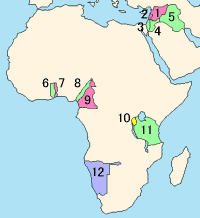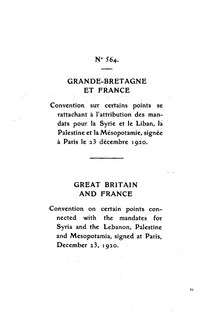
A League of Nations mandate was a legal status for certain territories transferred from the control of one country to another following World War I, or the legal instruments that contained the internationally agreed-upon terms for administering the territory on behalf of the League of Nations. These were of the nature of both a treaty and a constitution, which contained minority rights clauses that provided for the rights of petition and adjudication by the International Court.

The San Remo conference was an international meeting of the post-World War I Allied Supreme Council as an outgrowth of the Paris Peace Conference, held at Villa Devachan in Sanremo, Italy, from 19 to 26 April 1920. Resolutions passed at this conference determined the allocation of Class "A" League of Nations mandates for the administration of former Ottoman three territories in the Middle East: Palestine, Syria and Mesopotamia. Whilst Syria and Mesopotamia were provisionally recognized as states, Palestine was not.

The Emirate of Transjordan, officially known as the Amirate of Trans-Jordan, was a British protectorate established on April 1921.
British Mandate may refer to:

The Paulet–Newcombe Agreement or Paulet-Newcombe Line, was a 1923 agreement between the British and French governments regarding the position and nature of the boundary between the Mandates of Palestine and Mesopotamia, attributed to Great Britain, and the Mandate of Syria and the Lebanon, attributed to France. The 1923 line defined the border of Mandatory Palestine from the Mediterranean up to Al-Hamma, Tiberias. The 1920 line defined, in less detail, the border of the French Mandate for Syria and the Lebanon from the Mediterranean up to Jeziret-ibn-Omar.
The United Nations Palestine Commission was created by United Nations Resolution 181. It was responsible for implementing the UN Partition Plan of Palestine and acting as the Provisional Government of Palestine. The 1947–1948 Civil War in Mandatory Palestine and a refusal by the British government to impose a scheme which was not acceptable to both Arabs and Jews in Palestine prevented the Commission from fulfilling its responsibilities.

During the British Mandate over Palestine between 1920 and 1948, officially recognized by the League of Nations in the Palestine Mandate, the de facto flag was the Union Jack or Union Flag of the United Kingdom, but several localised flags existed for Mandate government departments and government officials. The only Palestine-specific flag not restricted to official government use was the Palestine ensign, which was flown by ships registered in the British Mandate territory from 1927 to 1948. This flag had an extremely limited use on land and was not embraced by either the Arabs or the Jews of the Palestine mandate territory. It was based on the British Red Ensign instead of the Blue Ensign since it was intended for use only at sea by non-government ships.
At the San Remo conference, the Mandate for Palestine was allocated by the League of Nations to Great Britain. France required the continuation of its religious protectorate in Palestine but Italy and Great Britain opposed it. France lost the religious protectorate, but, thanks to the Holy See, continued to enjoy liturgical honors in Mandatory Palestine until 1924, when the honors were abolished. The precise boundaries of all territories, including that of the British Mandate for Palestine, were left unspecified, to "be determined by the Principal Allied Powers". During that time, the British were in control of Palestine and the French took control of Syria, for which France had been given a mandate.

The High Commissioner for Palestine was the highest ranking authority representing the United Kingdom in the mandated territories of Palestine and Transjordan under the British Mandate for Palestine. In 1928, a separate post of High Commissioner for Trans-Jordan, the holder of which was responsible for overseeing Transjordan, was created; however, this post was always held simultaneously by the High Commissioner for Palestine.

The Ramle Subdistrict was one of the subdistricts of Mandatory Palestine. It was part of Lydda District of the British Mandate of Palestine. The sub-district's main city was Ramle. Its total population in 1944 was estimated at 123,490, of which 88,560 were Muslims; 29,420 were Jews; and 5,500 were Christians. A number of Palestinian Arab villages in the subdistrict were depopulated during the 1948 Palestine War, both by Jewish forces prior to the Israeli declaration of independence and after by Israeli forces. Following the war the area that had made up Ramla Subdistrict became a part of Israel's Central District.

Mandatory Palestine passports were travel documents issued by British authorities in Mandatory Palestine to residents between 1925 and 1948. The first brown-covered passport appeared around 1927, following the issue of the Palestinian Citizenship Order, 1925. From 1926 to 1935 alone approximately 70,000 of such travel documents were issued.

The Transjordan memorandum was a British memorandum passed by the Council of the League of Nations on 16 September 1922, as an addendum to the British Mandate for Palestine.
The Mandatory Palestine national football team represented the British Mandate of Palestine in international football competitions and was managed by the Eretz Israel Football Association.

The All-Palestine Government was established by the Arab League on 22 September 1948 during the 1948 Arab–Israeli War to govern the Egyptian-controlled enclave in Gaza. It was soon recognized by all Arab League members except Transjordan. Though jurisdiction of the Government was declared to cover the whole of the former Mandatory Palestine, its effective jurisdiction was limited to the Gaza Strip. The Prime Minister of the Gaza-seated administration was Ahmed Hilmi Pasha, and the President was Hajj Amin al-Husseini, former chairman of the Arab Higher Committee.

The British Mandate Palestine grid was the geographic coordinate system used in Mandatory Palestine.
The Palestinian Citizenship Order in Council, 1925 was a law of Mandatory Palestine that created a Palestinian citizenship for residents of the territory of the Palestinian Mandate, except for those resident in Transjordan. It was announced on 24 July 1925 and came into force on 1 August 1925. The Order remained in effect until 14 May 1948, when the British withdrew from the Mandate, and Palestinian citizenship came to an end. Israel enacted a Citizenship Law in 1952, while West Bank residents came under Jordan’s nationality law.

The Constitution of Mandatory Palestine, formally known as the 10 August 1922 Palestine Order-in-Council, was the codified constitution of Mandatory Palestine. It was first published on 1 September 1922 in an Extraordinary Issue of the Palestine Gazette.












